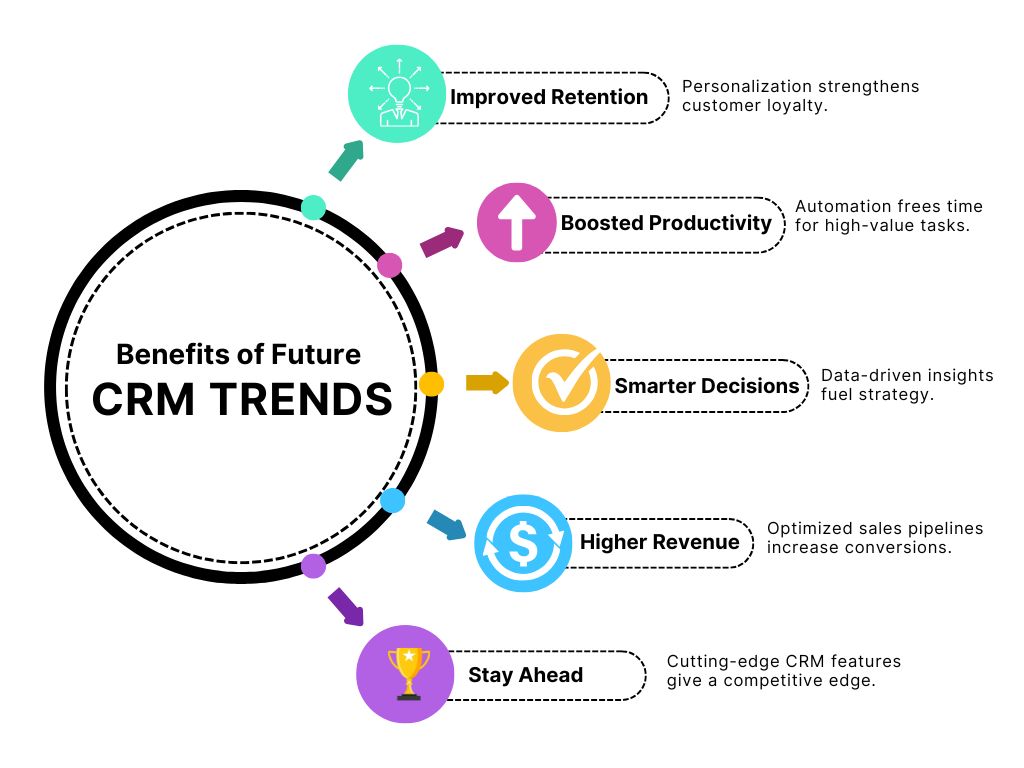As businesses continue to evolve and customer expectations rise, the role of Customer Relationship Management (CRM) systems becomes increasingly critical. In 2025, CRM is not just about managing customer data; it’s about leveraging technology to create personalized, seamless experiences across all touchpoints.
Emerging trends are set to revolutionize CRM, from artificial intelligence and machine learning to enhanced data analytics and omnichannel engagement.
Staying ahead of these trends is crucial for businesses aiming to build strong, lasting customer relationships and drive growth in a competitive market. Understanding these trends can make all the difference.
Emerging Trends in CRM for 2025: What You Need to Know
As we look ahead to 2025, the landscape of Customer Relationship Management (CRM) is poised for significant transformation. Driven by technological advancements and evolving customer expectations, CRM systems are becoming more sophisticated, intuitive, and integral to business strategies.
In this context, understanding the emerging trends in CRM is crucial for businesses aiming to stay ahead of the curve and foster meaningful, lasting relationships with their customers.
The Rise of AI-Driven CRM
The integration of Artificial Intelligence (AI) in CRM systems is revolutionizing how businesses interact with customers. AI-driven CRM enables companies to analyze vast amounts of customer data, predict behavior, and personalize interactions.
This not only enhances customer satisfaction but also streamlines sales processes, making them more efficient and effective. By leveraging machine learning algorithms, businesses can now identify patterns and trends that were previously undetectable, allowing for more informed decision-making.
Omnichannel Engagement Becomes the Norm
In 2025, omnichannel engagement will continue to be a critical trend in CRM. As customers increasingly interact with businesses across multiple touchpoints, CRM systems must be capable of providing a seamless, cohesive experience regardless of the channel.
This means integrating various platforms and tools to ensure that customer data is consistent and up-to-date across all interactions. By achieving this level of omnichannel consistency, businesses can build trust and strengthen their relationships with customers.
Enhanced Customer Data Privacy
With growing concerns over data privacy, CRM trends in 2025 will also focus on enhancing customer data protection. Businesses will need to implement robust security measures within their CRM systems to safeguard sensitive customer information.
This includes adopting advanced encryption methods and ensuring compliance with evolving data protection regulations. By prioritizing data privacy, businesses can not only avoid potential legal issues but also foster a deeper sense of trust with their customers.
| Trend | Description | Impact |
|---|---|---|
| AI-Driven CRM | Integration of AI for enhanced customer insights and personalized interactions. | Improved customer satisfaction and streamlined sales processes. |
| Omnichannel Engagement | Providing a seamless customer experience across all interaction channels. | Enhanced customer trust and loyalty through consistent experiences. |
| Enhanced Customer Data Privacy | Implementing robust security measures to protect customer data. | Better compliance with data protection regulations and increased customer trust. |
What is the future of CRM in 2025?

The future of CRM in 2025 is expected to be shaped by several key trends and technologies. One of the primary drivers of change will be the increasing use of artificial intelligence and machine learning in CRM systems.
This will enable businesses to gain a more nuanced understanding of their customers and to personalize their interactions with them.
Advancements in AI-Powered CRM
AI-powered CRM will become more prevalent, allowing companies to automate routine tasks, gain deeper insights into customer behavior, and make more informed decisions.
Some key features of AI-powered CRM include:
- Predictive analytics to forecast customer behavior and identify potential sales opportunities
- Automated customer service chatbots to handle routine inquiries and improve response times
- Personalized marketing campaigns tailored to individual customer preferences and behaviors
Integration with Emerging Technologies
The future of CRM will also be characterized by its integration with emerging technologies such as the Internet of Things (IoT), blockchain, and augmented reality. This will enable businesses to interact with customers in new and innovative ways, and to gain a more complete understanding of their needs and preferences.
Some potential applications of these technologies include:
- Using IoT data to track customer behavior and preferences in real-time
- Utilizing blockchain to create secure and transparent customer loyalty programs
- Leveraging augmented reality to create immersive and engaging customer experiences
Enhanced Customer Experience
Ultimately, the future of CRM in 2025 will be focused on delivering an enhanced customer experience through the use of data-driven insights and personalized interactions.
Some key strategies for achieving this include:
- Using data analytics to gain a deeper understanding of customer needs and preferences
- Implementing omnichannel engagement strategies to provide seamless customer experiences
- Leveraging customer feedback to drive continuous improvement and innovation
What are the 7 C’s of CRM?
The 7 C’s of CRM is a customer-centric framework used to manage and analyze customer interactions. It is an extension of the traditional 4 P’s marketing mix, focusing on building strong customer relationships. The 7 C’s stand for: Customer, Category, Competition, Cost, Channel, Communication, and Customization.
The 7 C’s provide a comprehensive approach to understanding customer needs and developing effective marketing strategies. By analyzing these elements, businesses can create targeted campaigns that cater to their customers’ preferences and behaviors.
Understanding the Customer
Understanding the customer is the foundation of any successful CRM strategy. It involves gathering and analyzing customer data to gain insights into their needs, preferences, and behaviors.
To effectively understand the customer, businesses should:
- Collect and analyze customer data from various sources, such as social media, customer feedback, and sales data.
- Use data analytics tools to identify patterns and trends in customer behavior.
- Develop buyer personas to guide marketing efforts and improve customer engagement.
Developing Effective Communication
Effective communication is crucial in building strong customer relationships. It involves creating a dialogue with customers and responding to their needs in a timely and personalized manner.
To develop effective communication, businesses should:
- Use multiple communication channels, such as email, social media, and phone, to reach customers.
- Personalize messages and offers based on customer preferences and behaviors.
- Respond promptly to customer inquiries and concerns.
Customizing the Customer Experience
Customization is a key element of CRM, as it allows businesses to tailor their products and services to meet the unique needs of their customers.
To customize the customer experience, businesses should:
- Use customer data to create personalized offers and recommendations.
- Offer flexible pricing and packaging options to meet different customer needs.
- Continuously gather feedback and make improvements to products and services.
Does CRM have a future?

The answer to this question is affirmative as Customer Relationship Management (CRM) continues to evolve and play a vital role in managing customer interactions across various industries. The future of CRM is promising due to its ability to adapt to new technologies and changing customer behaviors.
Advancements in CRM Technology
The future of CRM is closely tied to advancements in technology, including artificial intelligence (AI), machine learning (ML), and the Internet of Things (IoT). These technologies enable CRM systems to become more sophisticated, providing businesses with deeper insights into customer behavior and preferences.
- Predictive analytics allows businesses to anticipate customer needs and tailor their marketing efforts accordingly.
- Integration with social media platforms enables companies to monitor customer sentiment and respond promptly to feedback.
- Mobile CRM solutions facilitate access to customer data on-the-go, enhancing sales productivity and customer engagement.
Personalization and Customer Experience
A key aspect of CRM’s future is its role in delivering personalized customer experiences. By leveraging data collected through CRM systems, businesses can create targeted marketing campaigns and offer tailored services that meet the specific needs of their customers.
- CRM data helps in segmenting customers based on their behavior, preferences, and demographics.
- Personalized marketing messages lead to higher engagement rates and conversion.
- Effective use of CRM data enables businesses to improve customer satisfaction and loyalty.
Integration and Omnichannel CRM
The future of CRM also lies in its ability to integrate with other business systems and provide an omnichannel customer experience. This means that customers can interact with a business through various channels (e.g., email, phone, social media, chat) and still receive a seamless and consistent experience.
- Omnichannel CRM ensures that customer interactions are synchronized across all channels.
- Integration with other business applications (e.g., ERP, marketing automation) enhances the functionality of CRM systems.
- A unified customer view helps businesses in making informed decisions and improving customer service.
What are the trends in CRM industry?

The CRM industry is constantly evolving, driven by advances in technology and changing customer needs. Some of the key trends in the CRM industry include the increasing adoption of cloud-based CRM solutions, the integration of artificial intelligence and machine learning, and the growing importance of customer experience.
Cloud-Based CRM Solutions
Cloud-based CRM solutions are becoming increasingly popular due to their scalability, flexibility, and cost-effectiveness. They allow businesses to access CRM data from anywhere, at any time, and on any device. Some benefits of cloud-based CRM solutions include:
- Reduced IT costs and infrastructure requirements
- Improved collaboration and data sharing across teams
- Automatic software updates and maintenance
Artificial Intelligence and Machine Learning in CRM
The integration of artificial intelligence and machine learning in CRM is transforming the way businesses interact with customers. AI-powered CRM solutions can analyze customer data, predict behavior, and provide personalized recommendations. Some examples of AI and ML in CRM include:
- Chatbots and virtual assistants for customer support
- Predictive analytics for sales forecasting and lead scoring
- Personalized marketing and customer engagement strategies
Customer Experience and Omnichannel Engagement
Customer experience is becoming a key differentiator for businesses, and CRM plays a critical role in delivering seamless and personalized experiences. Omnichannel engagement is also becoming increasingly important, as customers expect to interact with businesses across multiple channels. Some strategies for improving customer experience and omnichannel engagement include:
- Using CRM data to create unified customer profiles
- Implementing omnichannel marketing and sales strategies
- Providing consistent and personalized customer support across channels
Frequently Asked Questions
What are the key CRM trends to watch out for in 2025?
The key CRM trends to watch out for in 2025 include the integration of AI and machine learning, enhanced customer experience through personalization, and the adoption of cloud-based CRM solutions. Additionally, businesses are expected to focus on omnichannel engagement and leveraging data analytics to drive customer insights and improve sales performance.
How will AI impact CRM systems in 2025?
AI is expected to significantly impact CRM systems in 2025 by automating routine tasks, providing predictive analytics, and enabling personalized customer interactions. AI-powered chatbots and virtual assistants will also become more prevalent, allowing businesses to respond to customer inquiries and resolve issues more efficiently.
What role will data analytics play in CRM in 2025?
Data analytics will play a crucial role in CRM in 2025 by providing businesses with valuable insights into customer behavior and preferences. Advanced analytics tools will enable companies to analyze large datasets, identify patterns, and make data-driven decisions to improve customer engagement and drive revenue growth.
How can businesses prepare for the CRM trends of 2025?
To prepare for the CRM trends of 2025, businesses should focus on investing in cloud-based CRM solutions, developing a robust data analytics strategy, and adopting AI-powered tools to enhance customer engagement. They should also prioritize employee training and development to ensure that their teams have the necessary skills to effectively leverage these technologies.


